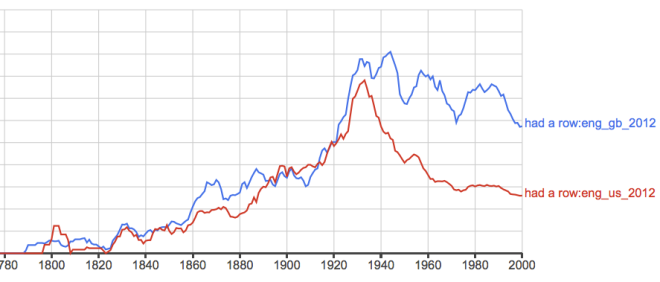Last month on National Public Radio, longtime Los Angeles Times columnist Patt Morrison said about a venerable L.A. drive-in movie: “You can get up to some romantic hanky panky if you want. Or you can have the kids asleep in the back seat.”
A couple of years ago, Tim Hererra, or the New York Times Smarter Living newsletter, had this signoff at the end of an entry on what to do with a day off: “Tweet me … and let me know what you get up to, and have a great week!”
They were both using the expression “get up to” in the sense of this OED definition: “to become engaged in or bent on (an activity, esp. of a reprehensible nature).” The dictionary’s first citation is from an 1864 book: “And you know, when people do get up to mischief on the sly, punishment is sure to follow.” That and the next four cites are British, the most recent being Kingsley Amis’s The Old Devils (1986): “As anyone might who was as keen as he on what you could get up to indoors.” The sixth and final quote is from an anonymous 2009 article in the American magazine Wired.
I can’t resist one more example, from a 2021 New York Times obituary of the Montreal-born photographer Marcus Leatherdale, who lived on the Lower East Side of New York in the late 1970s:
The Grand Street loft was an unusual household. [His wife Chloe] Summers was a dominatrix working under the name Mistress Juliette; one of her clients cleaned the place free of charge. [Robert] Mapplethorpe assisted Ms. Summers with her work by offering her a pair of leather pants, a rubber garter belt and S&M tips. Mr. Leatherdale, sober, tidy and decidedly not hard core despite his leather uniform, was mock-annoyed one morning when he awoke to find an English muffin speared to the kitchen table with one of Ms. Summers’ stilettos. “What did you get up to last night?” he asked her.
The OED and Google Books Ngram Viewer agree that this was originally a British expression. The apparent recent American adoption isn’t surprising, given that we’ve long similarly used “up to” without the “get,” for example, “He was up to no good.” For now I’m labeling it “on the radar.”


